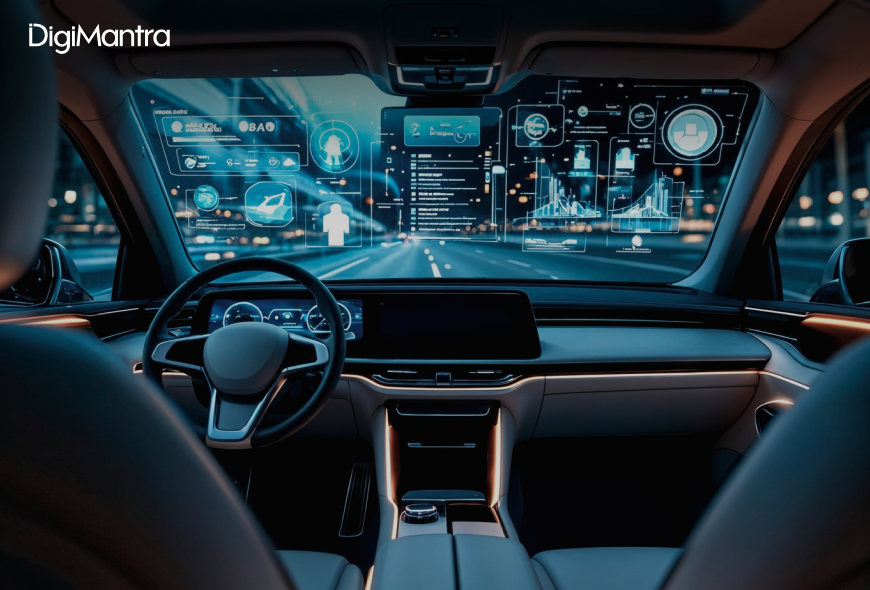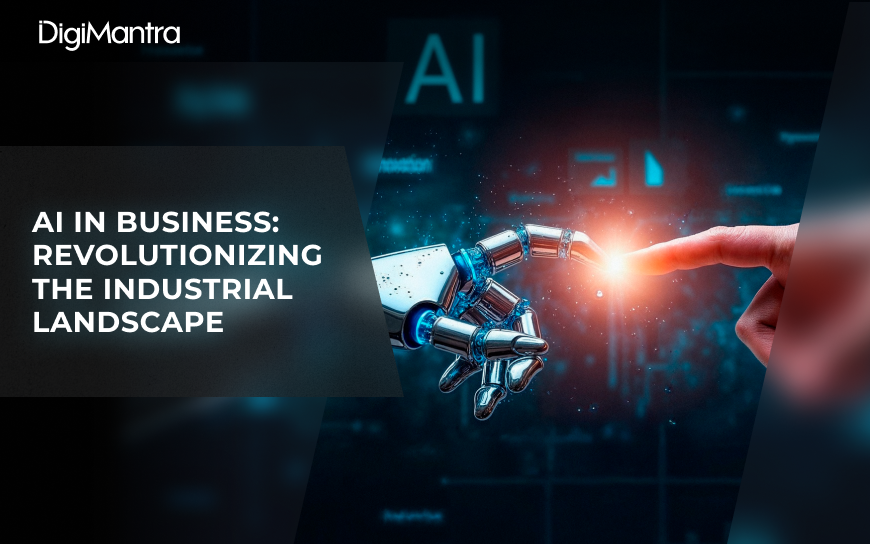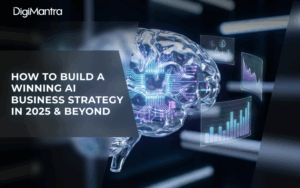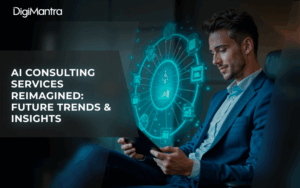Throughout the globe, businesses are experiencing the best of all times following the emergence of Artificial Intelligence (AI). AI enables businesses to make effectual decisions that provide them with a better approach to success in their fields. A Grand View Research report demonstrates that by 2030, the size of the global AI market is expected to rise from the existing $136.6 billion to almost $1,811.8 billion, totalling a 38.1% CAGR.
In everyday life, AI is prevailing at an exponential rate. It is a term that is now being used more frequently. AI is evident in our households, our phones, our businesses, healthcare, and almost every domain. According to IBM research, almost three-quarters of businesses are showing a deep inclination toward AI adoption.
In the present day, as artificial intelligence becomes more prevalent throughout the world, companies must join the trend expeditiously to have a competitive edge in the market.
How do Different Industries Use AI: AI Use Cases in Prominent Industries
AI delivers a wide-ranging variety of applications in numerous sectors. Let’s explore how different AI development companies assist with automating tasks, boosting efficiency, and accelerating decision-making for businesses across different industries.
The latest AI industry assessment has concluded that the impact of AI is significant on business development. In this section, you will learn about AI in business examples including the AI use cases in prominent industry operations.
AI in Healthcare
The unification of AI in the healthcare sector reflects a transformative strategy, enhancing patient health results, advancing research, and perfecting medical management. As a leading trend in healthcare technology, AI seamlessly leverages patient data to deliver personalized treatment with independent health records and hereditary information.
Smart algorithms help streamline administrative tasks and manage functions, like billing and medical coding, to lessen manual efforts and upgrade workflows.
For AI use cases in businesses, IBM Watson Health employs AI trends like cloud computing to decipher medical literature. By compiling and segregating patient records and clinical trial data, the company delivers insights for customized treatment plans. This results in achieving enhanced diagnostic precision and personalized treatment guidance.

AI in Retail & E-commerce
In the retail sector, AI algorithms examine customer behavior and inclinations to offer tailored recommendations, thus improving the whole shopping experience. Besides, it advances inventory management, ensuring sufficient stock levels and decreasing the probability of stockouts or overstock.
An intelligent inventory management system powered by AI software development services assists retailers with forecasting demands more accurately, preventing excess stock and ensuring famous items remain available.
As a leading example of AI in business, Amazon utilises AI for personalized suggestions based on purchase history and customer browsing. That's how, the company enhances overall customer experience, resulting in great customer satisfaction and increased sales.
AI in Training & Education
In the education industry, AI analyzes the learning patterns and preferences of students, adjusting content to individual requirements for an efficient learning experience. The collaboration of artificial intelligence in training promotes a more responsive learning approach, benefiting both learners and educators.
Speaking of instances of artificial intelligence applications in the education sector, Coursera employs AI for customized learning experiences. By accommodating content to suit individual students as per their preferences and learning patterns, the company optimizes student engagement and outputs.

AI in Banking & Financial Services
Finance companies operating on AI are commonly focussed on fraud detection. The machine learning algorithms diagnose real time transaction patterns to promptly identify and mitigate possible fraudulent activities. By modernising legacy systems using AI protocols, banking firms fortify security measures, forming a better data-driven financial environment.
AI-driven analytics supports in developing the risk assessment models that allow financial institutions to efficiently operate on creditworthiness and customize banking services.
Speaking of instances of artificial intelligence applications in the finance sector, JPMorgan Chase utilises AI in real-time analysis, which allows for prompt detection of irregularities, shielding both the financial firm and its customers.
AI in Logistics and Transportation
Real-time tracking and route optimization are the most employed use cases of AI software development services in logistics.
The supply chain algorithms of machine learning analyze real-time as well as historical data to identify the optimal delivery routes. This aids in reducing fuel consumption and improving overall operational efficiency.
Artificial Intelligence is further enhancing logistics by empowering autonomous vehicles and forecasting demand fluctuations, which allows supply chain actors to cut expenses while escalating deliveries.
FedEx masters the implementation of AI in business: this popular shipping company leverages artifical intelligence for smart package tracking and sorting. Employing AI services, they automate the entire sorting process in the distribution centres, guaranteeing efficient package handling.

AI in Manufacturing
For manufacturers, a pivotal application of AI is into predictive maintenance. AI algorithms examine cloud-based data on machinery sensors to predict probable equipment failures. This foresighted approach decreases unplanned downtime, reduces maintenance costs, and improves overall equipment effectiveness.
AI-based apps in production lines function alongside IoT devices, providing quality control, identifying defects instantly, and ensuring automated efficiency in the manufacturing industry.
Siemens comes as one of the remarkable real-life instances of artificial intelligence implementation for predictive maintenance. With the development of a data-based response management approach, the company reduces unexpected downtime and decreases maintenance costs.
AI in Hospitality
As sustainability technology trends rule the hospitality industry, hotels invest in AI ML solutions for efficient utilization of resources. AI is applied to the creation of energy management systems and smart room controls, which contribute to grander guest experiences. Businesses use AI/ML development services in hotels to examine guest preferences and customize offers according to the collected data.
Amongst tons of potential AI use cases in hotel processes, Hilton prioritizes smart energy management. Using sensors and other AI methods, they monitor and regulate cooling, heating, and lighting based on occupancy, thus diminishing energy costs.

AI in Energy and Oil & Gas
AI is employed to model and optimize reservoirs in the energy sector. AI algorithms examine production and geological data to improve reservoir management techniques. This aids in enhanced production efficiency, boosted oil & gas recovery, and optimal field development.
A great example of AI utilisation in this industry can be taken from ExxonMobil, which demonstrates thriving use cases of AI for businesses in reservoir optimization. The decision-making of the company is improved with AI-driven insights from the production data, resulting in greater resource recovery and better field development.
AI in the Automotive Industry
In case of autonomous vehicles, AI algorithms efficiently process data in cameras and sensors with features like advanced driver-assistance and autonomous driving systems. Moreover, AI processes that are in-built in cars contribute to tailored user experiences, offering key highlights like voice recognition, advanced infotainment, and predictive navigation.
For example, Tesla employs AI in its innovative electric vehicles for autonomous driving proficiency. AI systems study data from cameras and sensors to allow features like Full Self-Driving (FSD) and Autopilot.

Discover the Scope of AI in Business
If you’re geared up to employ AI development services in your business and give it a competitive advantage in the market, then DigiMantra will be pleased to guide you on this course. We offer innovative and bespoke digital solutions to enable businesses to reach their highest potential.
We, at our digital transformation company, bring you a complete suite of enterprise application development services to fuel your business into the future. Digital transformation is an ineluctable need of the time that every company must meet to innovate and expand flawlessly. DigiMantra is your technology partner that perfectly blends emerging technologies and human skills to build deep industry expertise and explore the full potential of your business.
Whether it’s about creating immersive experiences, strengthen your workforce, upgrade customer interactions, or improve customer experiences, we provide a comprehensive range of AI/ML development services customised to your specific needs.
Unlock Your Digital Potential Today!
Don’t just keep up, lead your industry.
Connect with DigiMantra’s top strategists and AI, web, and software experts to boost growth, streamline operations, and drive innovation.
Your transformation starts here.





